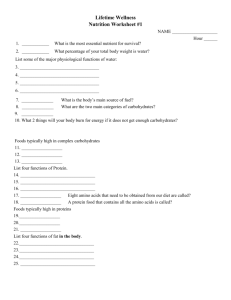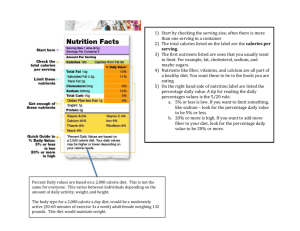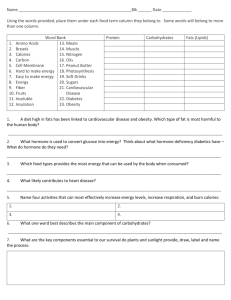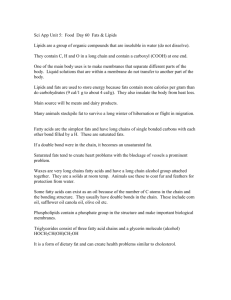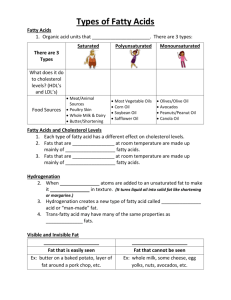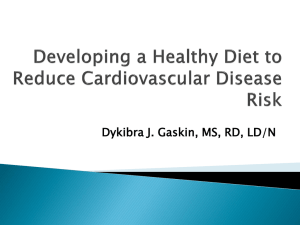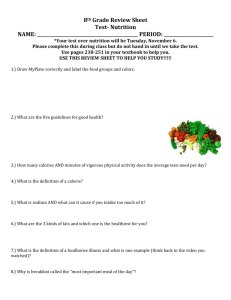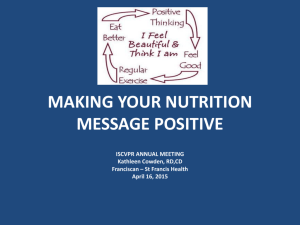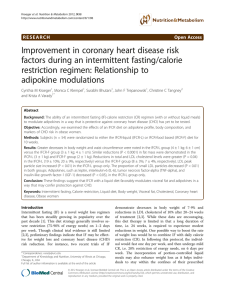Lecture 11 Lipids and Heart Smart Diet
advertisement
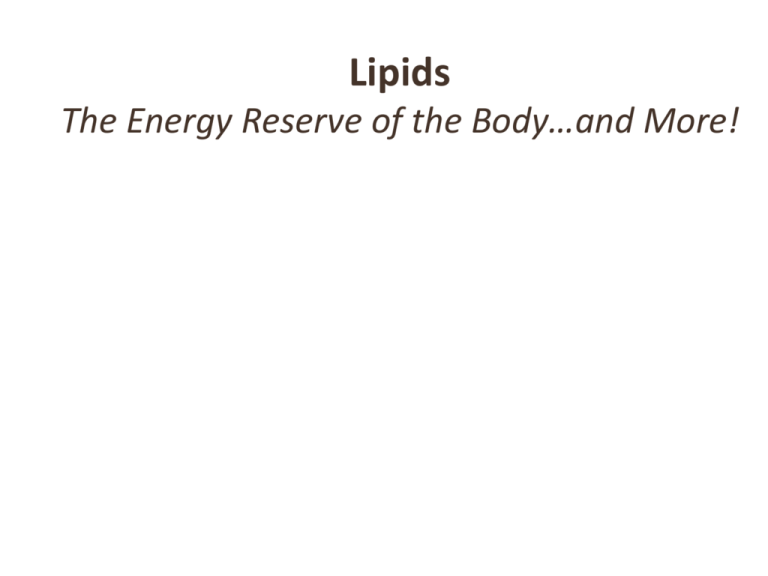
Lipids The Energy Reserve of the Body…and More! Body Fat Functions • • • • Insulation and padding Cell structure Nerve function #1 energy reserve • stored as triglyceride Food Fat (and oil) Functions Carrier for: • Fat soluble vitamins (ADEK) • Essential fatty acids • Fat soluble toxins/chemicals : ( • Tasty, aromatic calories • Present in food as triglycerides Basic Fat (and oil) Facts • Essential • Insoluble in water • Food sources – Fats: animal products, solid at RT, saturated – Oils: plant products, liquid at RT, unsaturated • Primary lipid in body and diet is triglyceride (TG) Triglyceride Glycerol backbone +3 fatty acids** C-----fatty acid C----fatty acid C----fatty acid **Fatty acid types saturated unsaturated: omega-3, trans, essential fatty acids What about Cholesterol? Good-Bad-Both? You decide. Think. Pair. Share. Nope! It has no flavor or nrg value even though a lipid Animal sources Made in liver Can’t live without it Precursor of • Bile • Sex hormones • Vitamin D In all cells Vital to CNS function Too much.. in wrong place vascular disease Calendar • Today – Eat Smart for a Healthy Heart – Exam 2 Thurs. Mar. 1 • Thurs. – Weight Management – Exam 2 review – Last day to drop with ‘W’ Fri. Feb. 26 Cardiovascular Disease • A disease of arteries • Cardio=Blocked heart arteries (with cholesterol, scar tissue, etc.) tissue beyond block dies • Vital part of heart dies person dies • #1 cause of death in US • #1 trigger initiating blockage? • Inflammation Influences on Inflammation • Dietary choices that can reduce it – Fruit/veggies/fiber/antioxidants, healthy fats/oils, etc. • Triggers that enhance it – Hypertension – Smoking – Diabetes – High saturated fat diet-NOT dietary cholesterol – High LDL cholesterol What is LDL? What is a lipoprotein? • Lipoprotein (LP); a ‘vehicle’ that moves fat soluble molecules thru blood • Many types of LP’s exist • LDL…bad (cholesterol) for heart health • HDL...good (cholesterol) for heart health • Both influenced by lifestyle choices What are the lifestyle steps to heart health? • • • • • • Maintain healthy weight Be active Manage stress Do not smoke Do not drink excessively Eat a Heart Smart Diet Heart Smart Diet Eat more color Eat less sodium Eat more fiber Eat the right fats Make ½ your plate vegetables and fruit Eat More Color: Fruit and veggies fiber, potassium, antioxidants (reduce inflammation) Eat Less Sodium (Na+) The primary culprit is…. 75% + from processed foods Rate this food Heart Health…sodium…..added sugar? • Sugar, hydrogenated coconut oil, corn syrup solids, instant coffee, cocoa, tri-sodium citrate, sodium caseinate, mono- and diglycerides, dipotassium phosphate, silicon dioxide, maltodextran, natural and artificial flavors, carrageenan, salt, lecithin, tetrasodium pyrophosphate, BHA DITCH IT! Flavored International Coffee : ( What would be a better choice? • Sugar, hydrogenated coconut oil, corn syrup solids, instant coffee, cocoa, tri-sodium citrate, sodium caseinate, mono- and diglycerides, dipotassium phosphate, silicon dioxide, maltodextran, natural and artificial flavors, carrageenan, salt, lecithin, tetrasodium pyrophosphate, BHA High Blood Pressure (HTN) and Sodium • Medications an option • ~½ cases Hypertension (HTN) respond to diet • The DASH diet- A healthy diet for all! • Dietary Approaches to Stop Hypertension DASH-It’s worth a try! Diet high in Ca, Mg, K, fiber Sodium < 2300 mg/day Sat fat < 7% of calories Lots of fruit, veggies, nuts and beans!! An excellent diet for all EAT MORE FIBER particularly soluble fiber Apples BOA Beans Oats Bump Up Your Fiber Intake Goal 25-38 grams • ¾ C bran flakes (5g) vs. ¾ C corn flakes (1g) • 1 apple (4.4) vs. ½ C apple juice (0) • ½ C lentils (7.8) vs. ½ C white rice (0.6) • 1 C raspberries (8) vs. ½ C canned fruit (1) • ¾ C oatmeal (3) vs. ¾ C cream of wheat(0.9) WHOLE FOODS RULE. Ditch the processed stuff! Apple Wellness N. Guerin RD, MS EAT THE RIGHT FATS • • • • TOTAL: ~20-35% Calories LESS: saturated (<25g/day) MORE: unsaturated AVOID: trans EAT LESS SATURATED FATS • Raises LDL: Clogs arteries • Produces inflammatory compounds that promote heart, and other diseases • Goal <7 % of calories • 2000 Calories 15 g • 3000 Calories 23 g SOURCES OF SATURATED FAT • Animal products • poultry/fish better than beef • Tropical oils Coconut, plam oil Verdict still out Moderate use advised SOURCES OF UNSATURATED FAT Includes Omega-3** and essential fatty acids • Nuts • Eggs • Plant oils • Avocado • Seeds • Fatty fish** AVOID TRANS FAT • No safe level of intake (<2 g/day) • Raises LDL and lowers HDL • ‘Snap foods’, partially hydrogenated oils, beef and its byproducts Yup, that includes cheese & ice cream! HEART SMART DIET in REVIEW Eat food. Not too much. Mostly plants M.Pollan Eat more color Eat less sodium Eat more fiber Eat the right fats Make ½ your plate vegetables and fruit Optional slides • Digestion: complicated, slow process • Absorbed as chylomicrons (lipoprotein= LP) • Chylos to liver Liver repackaged LPs • HDL • LDL EPA & DHA: The good stuff in O-3s Food Sources Oily fish (ready made EPA/DHA) BeSt! tuna, salmon, herring, sardines Vegetarian sources (ALA* EPA/DHA) Ok flaxseed meal, soybean/tofu/walnuts/ dark leafy greens/ fortified foods How Much Omega-3 for heart health? If you are healthy ~500 mg EPA and DHA/day If high triglycerides; heart disease; rheumatoid arthritis 1-3+ gm EPA and DHA daily
